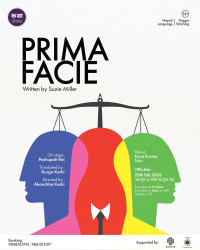Culture & Lifestyle
In ‘Sitaare Zameen Par’, Aamir Khan is needy for the audience’s love
An official adaptation of the Spanish sports drama, ‘Campeones’, the movie is full of questionable taste and needy filmmaking.
Tatsam Mukherjee
In RS Prasanna’s ‘Sitaare Zameen Par’, pegged as a spiritual sequel to ‘Taare Zameen Par’ (2008), Aamir Khan doesn’t want to leave anything to chance. So, in a slapstick scene, Khan’s character Gulshan Arora—a perpetually irate, foul-tempered, confrontational basketball coach—is barking instructions to his player.
It’s the final few seconds of the game, and the scorecard shows the teams neck and neck, this one penalty shot might seal the game for Arora’s team. He screams—“Be mindful! This is our only chance! You’re our Arjun, so keep your eyes on the prize! This whole game rests on you making the shot!” After a point even the player, Satbir (Aroush Datta), gets tired and tells Khan’s character to shut up.
As the gag ends with people giggling around him, Khan in his own exaggerated manner, gulps down the humiliation—without the slightest hint that his latest film is similarly verbose and patronising towards its audience.
Coming out of ‘Sitaare Zameen Par’, I was left wondering: how sincere is Aamir Khan’s humility and introspection? After his last film, ‘Laal Singh Chaddha’ (a remake of Forrest Gump, 1994) didn’t make money, Khan was vocal about how his performance let the film down. I couldn’t help but wonder if he would have responded similarly to the wide criticism against his performance (which was frankly unwatchable throughout that first half) if the film did well.
And nothing proves the hollow humility quite like his performance as Gulshan Arora here. So safe is the packaging around Khan’s deplorable protagonist, it defeats the very purpose of the film. Every single event in this film exists to rehabilitate Khan’s character, or to offer him an opportunity to become the patron saint of another cause.
After being a self-anointed preacher for dyslexia, India’s education system, religious dogmatism, patriarchy in Haryana—Khan has turned his gaze towards specially-abled people. However, it’s unfortunate that Khan takes this issue up while battling his growing insecurity as a star. His larger-than-life presence was irksome even before, but the way he bleeds a film’s crew to shine a spotlight on his acting ability has become the centre-piece of his films in the last decade. If Aamir Khan is the biggest liability of ‘Sitaare Zameen Par’, then what does it say about all that talk about his objectivity?
An official adaptation of Spanish sports-drama, ‘Campeones’ (2018), Prasanna’s film talks about the journey of a basketball team of specially-abled players under their foul-tempered coach. What begins as a dysfunctional relationship, goes on to become a feel-good sports film.
Making a sincere, straight-shooting, feel-good sports film, where a volatile character learns empathy–it shouldn’t be that hard, right? Wrong. And that’s because Aamir Khan can’t help but get in the way of his own film. It’s a strangely narcissistic tendency, where even the jokes at his expense (lots of references to his height for a basketball coach), feel like he is patting his own back.
Prasanna—whose last film ‘Shubh Mangal Savadhaan’ (2017) thoughtfully dealt with the precarious issue of erectile dysfunction in a middle-class household—looks like a significantly lesser filmmaker here. Unable to stage the easiest scenes, without turning them saccharine, we get a film that belts out cliches and inspirational platitudes one would expect in a terrible sports film.
By the end, Khan’s Gulshan can’t resist and even spells the moral of the film out loud—“I wasn’t their coach, they were coaching me”; such little faith in an audience that is probably scrolling through reels in the movie theatre. The problem with making a film for an audience that isn’t interested in your film is that there’s still only a 50/50 chance such exposition will make them sit up and take note. But, you’ll alienate the audience that is paying attention.
The specially-abled actors get a montage over Shankar Mahadevan singing “Good for nothing”, while the NGO’s caretaker (Gurpal Singh) tells everyone’s life story in bullet points to Gulshan, one after the other.
Only seen as ‘cute’ characters, humanising the specially-abled characters seems to be the last thing on the film’s mind. Till the very end, they remain a cause, a cause meant to enlighten Gulshan’s character. Written by Divy Nidhi Sharma, it’s a surprise how both Prasanna and Khan remain committed to keeping the commentary as broad-stroked as possible.
Another major problem I had with the film is the characterisation of Suneeta (Genelia Deshmukh), who is supposed to be the ‘saner’ spouse of the entitled, born-and-bred-in-Delhi Gulshan. However, in the handful of scenes she’s given, Deshmukh makes Suneeta sound like a nagging wife, eager to play mother. I found myself cringing each time she talks about how badly she wants to birth a ‘mini Gulshan’, completely unmoved by his pleas of not feeling ready to become a father.
There’s a late scene where Suneeta—who, we’re told, is a failed actor—is supposed to play a Haryanvi cop. The tough dialect, barely hidden by her pronounced English manner of speaking, I thought the film was hinting why Suneeta’s acting career didn’t take off. But that’s giving too much credit to a film that cares little for its audiences’ intellect.
Another very strange thing about ‘Sitaare Zameen Par’, is the incredulous ‘suggestion’ made by the censor board directing the makers to include a quote by PM Modi that reads along the lines of–In 2047, when India celebrates its 100th anniversary of independence, our specially-abled friends will be seen as an inspiration to the whole world. It’s strange because it’s such a vague quote, and nothing explains why it needs to be added to this film.
Underneath all the hodge-podge of how coming runner-up is better than winning–a stupid philosophy for a sports film (completely different from no bad blood, we’ll try to win it another day)—Khan signs off with a nice scene. It’s his last day at the NGO, and being the lifelong escapist, Gulshan leaves without saying goodbye to his team.
On his way out, he bumps into the new coach, and while filling him up on the dynamics of the team-members, he gradually starts to cry. It’s the one scene in the film that felt honest to me, but it’s under a rubble of questionable taste and needy filmmaking.
At 158 mins, this is the longest Aamir Khan has grovelled for our love and validation. A superstar who can’t read a room so he turns to all sorts of manipulation; a prime minister who likes to attach his name to anything his trusted people perceive as potentially successful; and an audience that can only sit around in the dark in bewildered silence–we all deserve each other.
Published in special arrangement with TheWire.in




 12.12°C Kathmandu
12.12°C Kathmandu















